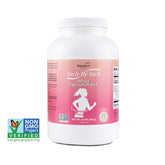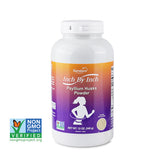Do You Really Need to Take Health Supplements?

These days, it seems like everyone is taking some kind of health supplement—whether it's vitamins, omega-3s, probiotics, or collagen. You’ve probably found yourself wondering,
“Do I need to take them too?”
Let’s break it down and see when supplements are helpful, and when they might just be unnecessary (or even harmful).
Not Everyone Needs Them
Here’s the truth: health supplements aren’t essential for everyone.
If you're eating a balanced diet with a variety of vegetables, fruits, protein, and whole grains, you're likely getting most of the nutrients your body needs from food alone.
For generally healthy individuals, especially those without any nutritional deficiencies or medical conditions, supplements often provide little added benefit—and in some cases, they may do more harm than good.
When Supplements Can Be Helpful
That said, there are situations where supplements can really come in handy. You might benefit from them if:
-
You often skip meals or have irregular eating habits
-
Your diet is lacking in variety or relies heavily on processed food or takeout
-
You spend most of your time indoors (→ possible vitamin D deficiency)
-
You're pregnant, breastfeeding, a growing teen, or an older adult
-
You frequently feel tired, run down, or have a weakened immune system
In these cases, supplements can help fill in the nutritional gaps.
For example, vitamin D, iron, calcium, or omega-3s are commonly needed by those who are deficient.
Be Careful—More Isn't Always Better
Here’s something many people overlook: too much of a good thing can be bad.
It’s tempting to load up on multiple supplements just to “cover all your bases,” but that approach can backfire.
Taking too many different products—or exceeding the recommended doses—can stress your liver or kidneys, and lead to side effects.
In particular, fat-soluble vitamins (A, D, E, K) and minerals like iron or calcium can be harmful when overconsumed.
So always read the labels and avoid megadoses unless your doctor recommends them.
Know What Your Body Needs
The best way to approach supplements is to think about your personal needs.
Have you done a recent health check-up?
Do you often feel fatigued, have brittle nails, or struggle with sleep?
Those small signals might indicate something's missing.
It’s a great idea to talk with a healthcare professional—like a doctor, pharmacist, or dietitian—before jumping into any supplement routine. That way, you’re choosing products that actually suit your body and lifestyle.
Final Thoughts
Think of health supplements as a bonus, not a substitute. They’re there to support a healthy lifestyle—not replace one. In the end, the best thing you can do for your health is simple:
Eat well. Sleep well. Move often.
Supplements come after the basics are in place—not before.
![Inch By Inch (Psyllium Husks Powder) [Buy 4 Get 1 FREE] - Health Korea Shop](http://healthkoreashop.com/cdn/shop/files/health-korea-shop-default-title-inch-by-inch-psyllium-husks-powder-buy-4-get-1-free-26476880429165_165x.gif?v=1757024963)
![Inch By Inch (Psyllium Husks Powder) [Buy 4 Get 1 FREE] - Health Korea Shop](http://healthkoreashop.com/cdn/shop/files/health-korea-shop-default-title-inch-by-inch-psyllium-husks-powder-buy-4-get-1-free-26471389102189_165x.jpg?v=1757024971)
![Inch By Inch (Whole Psyllium Husks) [Buy 3 Get 1 FREE] - Health Korea Shop](http://healthkoreashop.com/cdn/shop/files/health-korea-shop-default-title-inch-by-inch-whole-psyllium-husks-buy-3-get-1-free-26471348764781_165x.jpg?v=1757024989)

![Inch By Inch (Organic Psyllium Husks Powder) [Buy 3 Get 1 FREE] - Health Korea Shop](http://healthkoreashop.com/cdn/shop/files/health-korea-shop-default-title-inch-by-inch-organic-psyllium-husks-powder-buy-3-get-1-free-26471394771053_165x.jpg?v=1757024965)
![Inch By Inch (Organic Psyllium Husks Powder) [Buy 3 Get 1 FREE] - Health Korea Shop](http://healthkoreashop.com/cdn/shop/files/health-korea-shop-default-title-inch-by-inch-organic-psyllium-husks-powder-buy-3-get-1-free-26471394803821_165x.png?v=1757025003)

